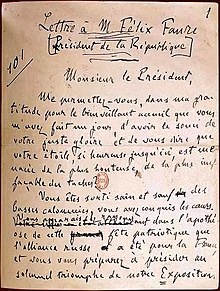J'accuse
J'accuse ...! ( French for I accuse ...! ) is the title of an open letter from the French writer Émile Zola to Félix Faure , the then President of the French Republic , to inform him and the public about the true background of the Dreyfus affair . The letter appeared in the daily L'Aurore on January 13, 1898 , caused a major political scandal and gave the Dreyfus affair a decisive turn. J'accuse has also entered German usage as a name for a courageous, public expression of opinion against the abuse of power.
background
Three years earlier, in 1894, the French captain Alfred Dreyfus had been sentenced to life imprisonment on the Devil's Island on account of forgeries for alleged espionage in favor of the German Reich . When a new investigation revealed Dreyfus' innocence and Major Ferdinand Walsin-Esterházy was identified as the real perpetrator, the General Staff nevertheless stuck to Dreyfus, who was Jewish and Alsatian .
As early as November 1896, the journalist Bernard Lazare had affirmed Dreyfus' innocence in his polemic " Une Erreur Judiciaire: La Vérité sur l'Affaire Dreyfus " (German: "A miscarriage of justice: The truth about the Dreyfus affair").
The immediate impetus for Zola's open letter was Walsin-Esterházy's scandalous acquittal. Zola now publicly explained the background to the case and accused high-ranking officers of the General Staff and the military justice as well as some experts and conservative press organs involved in the case of anti-Semitism , lies and deliberate perversion of justice in the Dreyfus case. The letter was published on the front page of the newspaper and caused a huge stir in France and abroad. Zola was then charged with defamation , as he had foreseen and accepted at the end of the letter, and sentenced on February 23, 1898 to one year in prison. To avoid prison sentence, he fled to England, from where he did not return until June 1899 after being pardoned .
content
Émile Zola pointed out the numerous legal errors and falsifications as well as the complete lack of reliable evidence against Dreyfus. He stated that Dreyfus' conviction was based on false allegations and constituted a gross miscarriage of justice , the main culprit he identified as the investigating Major Armand du Paty de Clam . The methods of investigation and the charges indicated bias, incompetence and manipulation. Zola also shed light on the "Esterhazy affair", ie the acquittal of the guilty party. The officers, caught up in their lies, would not have dared to testify to the truth out of the spirit of the corps . The general staff, infiltrated by the Jesuits , had instead used the “dirty press” for anti-Semitic propaganda.
effect
Zola's letter raised the debate about Dreyfus' guilt or innocence to a higher level and split France into two camps: here the anti-Semitic military who, with the support of the nationalist-clerical right, had orchestrated the illegitimate espionage trial against Dreyfus; there the liberal-bourgeois intellectuals, who saw through the judicial scandal in increasing numbers, and with them the socialist left, for whose persecution the Dreyfus affair served as an occasion (cf. Jean Jaurès ). The essay, which sold 300,000 copies two days later, turned the debate into a fundamental dispute about the character of the Third Republic . French society showed itself to be deeply divided: Those who believed in Dreyfus' innocence and supported Zola identified themselves as supporters of a liberal, secular republic that gave human rights priority over reasons of state ; Those who clung to Dreyfus' guilt expressed their sympathy for a right-wing conservative attitude, which saw the military and the Catholic Church as indispensable pillars of the state, to which in case of doubt the fate of an individual was ready to sacrifice.
After years of sometimes violent clashes between the two social camps, the left and liberal forces (“Bloc républicain”) prevailed in the parliamentary elections of 1902. In 1905, the new majority passed the Law for the separation of church and state .
The secular character of today's constitution of the Fifth French Republic is therefore a direct consequence of the Dreyfus affair and of Zola's open letter . In the meantime, the French league for the defense of human and civil rights was founded in 1898 , and Dreyfus was finally pardoned, but he was not acquitted and rehabilitated until 1906.
literature
- Vincent Duclert: The Dreyfus Affair . Military mania, hostility towards the republic, hatred of Jews ("L'affaire Dreyfus"). Wagenbach Verlag, Berlin 1994, ISBN 3-8031-2239-2 .
- Pierre Miquel : L'affaire Dreyfus (= Que sais'je? Volume 867). 9th edition. Presses universitaires de France (PUF), Paris 1996, ISBN 2-13-044345-1 .
- Alain Pagès: January 13th 1898, j'accuse ...! Perrin, Paris 1998, ISBN 2-262-01287-3 .
- Joseph Jurt : France's committed intellectuals. From Zola to Bourdieu. Wallstein, Göttingen 2012, ISBN 978-3-8353-1048-3 .
Web links
- J'accuse in German translation. (PDF; 119 kB) (No longer available online.) In: yunus-rigo-process.de. June 10, 2008, archived from the original on February 20, 2016 .


